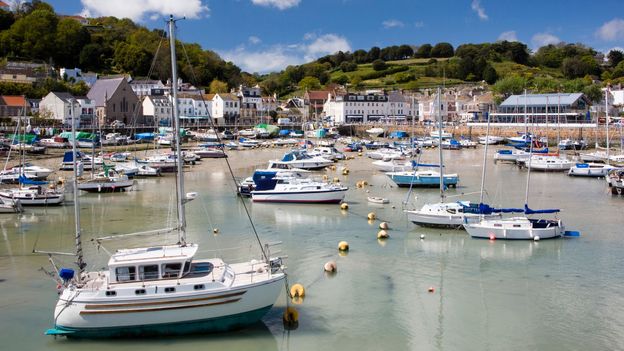Linguistically, Jèrriais’s closest relative is Norman French, a dialect that dates back to the days when Normandy was still its own independent kingdom, and which incorporates many words from Old Norse, a legacy of the Normans’ own Viking ancestry. Jèrriais shares much in common with the other languages of the Channel Islands, including Guernésiais (Guernsey) and Sercquiais (Sark), which are still spoken by a handful of people, and Auregnais (Alderney), which died out in the late 19th Century.
The first written record of Jèrriais dates from the 12th Century and the poet Wace, whose works Roman de Brut and Roman de Rou represent the earliest extant examples of the language – although Jèrriais was undoubtedly being spoken on the island long before Wace first put quill to parchment. As recently as the 1930s, Jèrriais remained the mother tongue for most Jersey-born people, but not everyone spoke quite the same version of the language. Since roads were poor and most islanders rarely travelled beyond their own home parish, every area of the island developed its own words, phrases and accents, which were often entirely different from those of their neighbours – an extraordinary fact on an island that measures just nine miles by five.
Today, however, it’s a different story. According to the Endangered Languages Project, Jèrriais is a language on the brink. In the 2002 census, only 15% of islanders said they understood at least some Jèrriais words; today it’s thought that figure is closer to 5%. Fluent speakers are even rarer; there are now fewer than 500 native Jèrriais speakers left, mostly in their 70s and 80s.
Among them is Francois Le Maistre. Now 85, he grew up in the parish of St Ouen, in the island’s west. Like most of his friends, he spoke solely Jèrriais at home; his father, Frank, compiled the first official Jerriais dictionary, published in 1972. It was only once he went to school that Le Maistre spoke English for the first time – and it came as a rude awakening.
“I started school in 1944,” he recalled. “I wasn’t quite six and a half and I didn’t know a word of English. All my classmates were the same. And we all had to learn English pretty darn quick, because in the 1940s and ’50s, if you went to school and spoke Jèrriais, it was forbidden. If we spoke in Jèrriais…” he broke off and made a slapping sound with his hand. “It didn’t matter which school you went to. Jèrriais was seen as a peasant language, a language spoken only by poor people. That was the attitude from all the teachers, even the ones that spoke Jèrriais. It was really very sad.”

